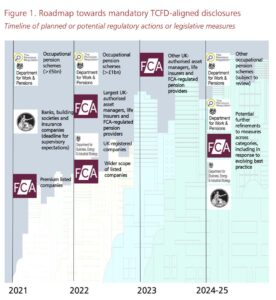Recently the UK government have announced that disclosing climate risk analysis reports will be mandatory for organisations from 2025, with a large majority of requirements and rules being put in place by 2023. These requirements have been set by the government in order to meet the plans of being net-zero and to take on board the advice of the Taskforce on Climate Financial Disclosure (TCFD) to ensure organisations are reaching their climate targets. The UK will be the first country to make these reports mandatory in order to invest more into ‘carbon reducing projects’ and to force large organisations in to making a real difference in their efforts to prevent global warming.
The Government has produced and shared a report on their “Roadmap towards mandatory climate-related disclosure” which details the intentions of these climate reports, the outcomes and the actions that organisations will need to implement. The main focus being on rebuilding the global economy through sustainable methods that will support a ‘green recovery’ and to hit the collective climate targets that have been issued in the Paris Agreement and United Nations Sustainable Development Goals (SDGs) for 2030.
But what impact does the climate disclosure have on organisations?
To put it bluntly, this is significant to UK organisations and a big gamechanger for the fight against climate change and developing a more sustainable world. Organisations will legally required be more transparent in how they are reducing their own air pollution and eliminating any emission risks. UK Organisations will need to comply with the rules by sharing ‘high-quality’ disclosures that highlight any activity that contributes to air pollution and explaining what they are doing to combat any issues that are causing excessive toxic air or gasses.
This means that organisations will be expected to change how they operate and actually put in place more sustainable methods, tools and procedures in place to prove they are reducing their pollution rate and on target to be net zero. Referencing the new mandatory disclosure, Doug Parr, Greenpeace UK’s Policy Director commented: “Tackling climate change means the corporate sector is not just green round the edges but green right to its core. The chancellor’s plans to make disclosure mandatory for companies is right if the rules are compulsory and thorough” (Bloomberg, 10th November 2020).
 Of course, for a few organisations this will be quite overwhelming as it will mean they now have to change their approach but for a portion of companies the change won’t be as drastic as they have been ahead of the game with investing and measuring SDGs and implementing methods to reduce pollution.
Of course, for a few organisations this will be quite overwhelming as it will mean they now have to change their approach but for a portion of companies the change won’t be as drastic as they have been ahead of the game with investing and measuring SDGs and implementing methods to reduce pollution.
The TCDF and whole government have expressed that the mandatory line is key to accelerate progress on sustainability and becoming net-zero, as a voluntary approach would not produce the results that local areas, organisations and the whole UK need to be reaching. In order to achieve the net-zero goal as an organisation, the UK government have clearly stated that a coordinated and mandatory approach is essential.
What can organisations do to produce these climate disclosure reports, and then identify and reduce high-risk pollution issues?
Organisations will need to be measuring any business activity that produces pollution (if they aren’t already) including transportation, construction, agricultural machinery, the impact of every part of the supply chain and production facilities. It can be quite daunting to think of how to measure all of these activities and to know how you can highlight the biggest pollution risks, but there are many air pollution tools out there that can help with monitoring this. In order to assess your climate risks and opportunities, companies will need to have a way to analyse, measure and evaluate pollution impact. This way you can transparently share if the organisation is on course for meeting air quality targets.
On the topic of organisations tackling the new climate disclosure legislation, Lord Callahan Climate Change and Corporate Responsibility Department for Business, Energy & Industrial Strategy) stated: “Building back greener will not be possible without giving investors and companies all the tools they need to manage climate change-related risks. Today’s Roadmap is an important part of our work to strengthen the UK’s position as a global leader on green finance – essential to reach net zero emissions by 2050”.
UK organisations and councils are using EMSOL because they can accurately report on their pollution impact and to make data-led decisions based on these insights. Organisations such as Veolia, NHS, John Lewis, and local councils are using EMSOL to monitor their real-time pollution, to target and focus on riskiest issues and to help achieve their net-zero targets. You can find out how EMSOL’s air quality monitoring dashboard works here and if you want to book a free consultation demo to see how it can help your organisation then contact us here.
